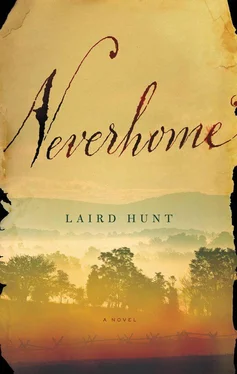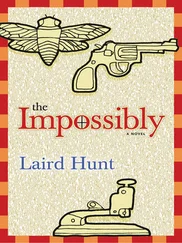I asked the tongueless man next to me to hold my place in the line and pointed over at the trees beyond the yard surrounding the schoolhouse. He looked out to the vultures and nodded. Another next to him, whose injury I could not discern, said he would help hold my place, all day if need be, unless of course I was going off into the trees to die. I walked through more hurt men as I made my way but these did not call out at me.

The first time I ever laid eyes on Bartholomew was in the yard of a house used to stand one mile due east of my farm. He had come with some other boys to see if it was true that the house was haunted and I had come to deliver a basket of sweet corn. The family had moved into the house was Irish or German or Italian or some such but the folks around here called them gypsies. The husband was far away on the railroad and it was just the woman and her two babies. I had got to hold them both. They were good babies, fresh and fat. I saw the boys trying to peek into a window and put down my basket and chased them off. Bartholomew stood his ground a minute before he ran. I got right up to him and he smiled at me, then he took off like a shot. The woman came out to thank me right then or I would have stood there and watched Bartholomew run. He was barefoot and had a floppy brown hat on his head. He was about the strangest thing I had ever seen. The next day he found me out where I was working a barley row and handed me a fresh-picked red zinnia. I’d never had a flower put into my hand before and I expect I stood there struck dumb. After he had handed it to me he did a little bow I never got him to repeat and again broke off into his run.
I could not run after I had left the schoolhouse-hospital grounds and climbed a fence and gone into the trees. My arm felt like it weighed sixty pounds and was pressed out everywhere against my sleeve. About half my head felt hot and the other half cold. There was a stinging down my legs like nettles had gotten in my pants. I couldn’t run but I thought about Bartholomew running, those years ago, when he had been a boy and I had been a girl. At our wedding three years to the day after he put that flower in my hand we had a basket of zinnias. Every color they come in, though mostly deep, heart-smoking red.
You can’t ever know when the dead world will come to you. Only that it will. My mother liked to tell me that. She who liked to send me down to the neighbor woman with any extra food we had. She who one night not a month after Bartholomew had handed me that zinnia walked through a crowd that had gathered outside the woman’s house with muskets and pitchforks and lit torches and went and stood with her arms crossed on that neighbor woman’s front porch. She had left in the night while I was asleep but I heard her leaving and followed her through the dark. When I came out of the cornfield I could see her pushing through the crowd. Beautiful and fearsome. Like a scythe through summer grass.
All this I chewed on as I walked that wood. Southern wood, fern and creeper. It was deeper and darker than I had thought on parting its curtain. I had this idea that they might send someone after me and kept looking over my shoulder, though who amongst that sick company and those overworked doctors they could have dispatched, I do not know. I tried to send hard thoughts to my arm. I thought to it that sick as it was or it wasn’t, I would just as soon it kept hanging where it was.
I had to stop and rest fairly frequent but after a time of walking I managed to traverse the woods. It was dusk now. I came out onto a road that led over a hill to a town. Down that road a group of people were walking and in that group was a nurse. They had none of them seen me so I stepped back into the trees and when they had passed on a ways I went out again after them. The nurse had on a dark blue cape and a white cap was covered in filth and grime. Everyone in the group had soiled hands. The men had the dirt up to their elbows. I imagined the nurse did too. They walked fast. I kept expecting one of them to turn and ask me my business so I fried up some story I’d tell about why I was walking alone on the road behind them but not a one of them did. Not a one of them even seemed to notice me as I walked into town, past a cobbler, a dry-goods store, and a stable, and saw where the group broke up and the nurse had her home. There was a dead-end alley next to the cobbler’s with some boxes piled at the end of it. I walked back there and down that alley and dropped myself behind the boxes. I thought I would sleep but I didn’t. I lay there a long while, eyes open, looking up past the walls to the sky, past the sky to the stars, past the stars to my death out there, past my death to the final dark. Then I heaved myself up and walked over to the nurse’s house. It was a cottage with a garden might have been pretty if it had been kept up. There was lamp lit on the front porch. A mat worn down to its nubs.

Her name was Neva Thatcher and she had thick brown locks. She had blue eyes and high cheekbones and small fine fingers liked to work at the air. She could swat a fly dead before you had seen it land, but she was slow when she didn’t have to be fast. She never, the time I knew her, spoke loudly or needed to step first through a door.
She had been born up in Maine and had moved south with her husband before the war. This husband had gone off in the first weeks after Fort Sumter to fight as an officer for the Confederacy and had never come home. She had a letter from him, dictated as he lay blinded and expiring at Bull Run, that asked her to bid farewell to the sun for him, to pay his fondest courtesies to the grass, to salute the pretty waving trees. When the Union had taken her town she had quickly set aside the burden of her angers and gone to work in their hospital. She did whatever she was asked. Mopped floors, washed saws, dropped cut limbs out the window. Many times she would just sit and hold the hands of dying men.
She knew how to dress wounds and keep them clean. She had first thing I arrived dressed and cleaned mine. She had let me lie down on her own bed and had kept the curtains closed and fed me soft bread and stewed peaches and dripped water from a clean rag into my mouth. When she had seen what I was, standing there on her front step and none too gently dying, she had said nothing, had just taken me by the arm that wasn’t swollen and led me in.
I stayed three weeks in her little house and when I began to be well enough she gave me one of her dresses and helped me to a chair in the kitchen and let me sit by the open window and suck a little at the breeze. She had good rations of salt and sugar and sowbelly and hardtack and fresh bread for her work for the cause. She shared them all with me. She liked to read. Had a wall full of books. Each day she wrapped one or two of them in a cloth and carried them off to the hospital to read to the men. She read to them about hearts and flowers and pharaohs and mountaintops and clear-running brooks. She read to them about Jerusalem and chariots and trumpets and ghosts and lambs. I know what she read to them because in the evenings she would read to me.
Tired and whipped as I was, some of the gay finery of the images she was conjuring rubbed me wrong. I expected the Colonel wouldn’t have thought anything too much of them either. But you couldn’t hold it against her. She didn’t seem to need any of it to mean too much. One voice saying soft things into another’s ear. She was as wore out as any of us and every morning like any of us who was able she rose and did her work. She didn’t give the day too much of her smile but she had one. I saw it. She had a china service was her pride and joy. Came from a grandaunt back in Maine. Flower and animal was the theme but about every piece to the service was painted different. Neva said it was the work of more than twenty hands. There were doves had an eager look to their eye peeping out from behind indigo roses. Yellow cats asleep under dogwood. Owls perched on plum trees. Wolves howling next to holly. Cows and sheep nibbling buttercups in a field. The service had lived through the trip down south and it had lived through the war. The teapot to it was Neva’s greatest treasure. You did not have to work at it too hard to look over her shoulder as she dusted at it and admire the shades of pink seemed to have come off real roses, the careful greens seemed to have come off real leaves, the deep blues of the feathers of its many birds. The teapot was Limoges, she said. Her grandaunt had painted it herself and Neva gave it a swipe about every day I was with her. Each time she did that chore there would alight on her face a smile.
Читать дальше













